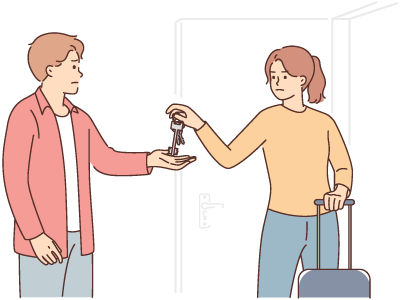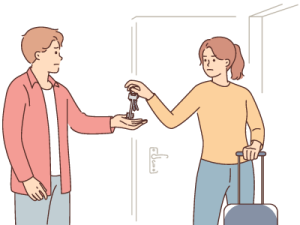Can a Jointly Owned Property Be Sold by One Owner?
- If one joint owner wishes to sell a property and the other refuses, an application can be made to the court for an order for sale under the Trusts of Land and Appointment of Trustees Act 1996 (TOLATA).
- A legal or beneficial owner can apply to the court to force a sale, even if their name isn't on the title deeds.
- The court considers various factors, including the original intentions for the property, its purpose, the welfare of any minors, and the interests of secured creditors.
- The court has discretion and may not always order an immediate sale, especially if it's a family home with children.
- Five different types of court orders can be awarded, ranging from refusing a sale to ordering one, sometimes with conditions.
- Legal costs for obtaining a court order to force a sale can range from £2,000 to £20,000 or more, depending on complexity and whether the case goes to a full hearing.
- Ignoring a court order to sell a house can lead to serious consequences, including being held in contempt of court.
Can one owner force a sale of a jointly owned property?
The straightforward answer is generally no, not without a legal resolution. However, the law provides a clear pathway to resolve such disputes through an application to the court for an order for sale.
In England and Wales, disputes over jointly owned property are governed by the Trusts of Land and Appointment of Trustees Act 1996 (TOLATA).
Section 14 of TOLATA states that any person who is a trustee of land (a legal owner) or has an interest in property subject to a trust of land (a beneficial owner) may apply to the court for an order regarding the property.
Legal or Beneficial Ownership?
You can force the sale of a jointly owned property even if your name isn't on the title deeds, but you need to prove you have a 'beneficial interest' in the property.
A beneficial owner is someone who has an equitable interest in the property's value, even if they're not registered as a legal owner at the Land Registry.
This can arise, for example, if you've contributed to the mortgage repayments, paid for renovations, or there was a clear agreement that you would have a share.
For instance, if a couple purchased a home in one partner's sole name, but the other partner has consistently contributed to the mortgage for years, the contributing partner likely has a beneficial interest and could apply to the court to force the sale of the house to recover their interest.
Joint Tenants or Tenants in Common?
How you jointly own the property also impacts your rights, particularly if you're considering selling half of your share:
- Joint Tenants: If you are joint tenants, you collectively own the whole property, not distinct shares. This means you cannot sell your 'half' independently. For a sale to proceed, all joint tenants must agree, or a court order is required to sever the joint tenancy and then force a sale.
- Tenants in Common: If you are tenants in common, you each own a distinct, quantifiable share of the property (e.g., 50/50, 70/30). While you can sell your individual share to a third party, finding a buyer for a partial share of an occupied property is extremely difficult. In practice, if one tenant in common wants to sell the whole property and the other doesn't, a court application under TOLATA is usually the most effective route.
Book a FREE 15-minute meeting* with a specialist property dispute solicitor/consultant. They'll listen to your issue and suggest ways forward, including the costs, with No Obligation to use our services after the free meeting.
- How can you force a sale?
- What are you due on sale?
- Mediation and Settlement Agreements.
- Applications to court, including Declaratory Orders, Regulatory Orders, Occupational Rent.
How the court decides: Legal grounds for a forced sale
When one joint owner refuses to sell, and an agreement cannot be reached, the court steps in to decide whether to grant an order for sale. This is not an automatic process; the court has discretion and will carefully consider all circumstances before making a decision.
The court's decision-making process is guided by Section 15 of the Trusts of Land and Appointment of Trustees Act 1996 (TOLATA). This section outlines the specific matters the court must consider, ensuring a fair and balanced outcome:
- The intentions of the person or persons who created the trust: What was the original purpose of buying the property? Was it intended as a family home, an investment, or a temporary residence? The court will look at the intentions at the time of purchase and whether those intentions have changed.
- The purposes for which the property subject to the trust is held: This considers the current use and purpose of the property. For example, if it's still serving its original purpose as a family home, this might weigh against an immediate sale.
- The welfare of any minor who occupies the trust as their home: If children under 18 live in the property, the court will prioritise their welfare. This often makes obtaining a court order to force the sale of property much harder, at least until the youngest child reaches the age of 18 or other suitable arrangements can be made.
- The interests of any secured creditor of any beneficiary: If there's a mortgage or other secured loan against the property, the court will consider the lender's interests. This usually means ensuring the sale proceeds are sufficient to clear outstanding debts.
- The wishes of any beneficiaries of full age and entitled to an interest in possession: The court will take into account the wishes of all adult beneficial owners, particularly if a majority (by value of their combined interests) wish for a particular outcome.
It's important to understand that no single factor takes precedence over the others; the court will weigh all relevant circumstances. This means that while one legal owner may want to sell, there is no guarantee you'll obtain an immediate order for sale, and the legal costs can be substantial.
Joint owners are often encouraged to explore mediation before resorting to court, or to set out their intentions clearly within a Deed of Trust.
What are the different Court Orders for forced sales?
The court can award one of five different types of orders:
Refuse a sale:
The court may decide not to order a sale at all.
This often happens when the property's original purpose (e.g., a family home for children) is still active, and ordering a sale would cause undue hardship or go against the initial intentions of the owners.
Section 15(3) of TOLATA 1996 states that the court must also consider the wishes of any beneficiaries of full age and entitled to an interest in possession, or (in case of dispute) of the majority (according to the value of their combined interests).
If the majority of the co-owners wish to sell, then the court would normally order a sale. This is particularly relevant in situations with more than two owners.
For example, if there are three legal owners and two want to sell, their collective wishes often weigh heavily with the court. In such cases, the party who doesn't want to sell might find it more pragmatic to agree, potentially saving legal and court fees.
Proving original intentions in joint ownership disputes
When a dispute arises over selling jointly owned property, the court will consider the original intentions of the legal owners at the time of purchase, and whether those intentions have changed over time.
Joint owners typically have agreed on the purpose of the property between them. Common examples of original intentions include:
- Family Home: A couple buys a home as their main residence, intending to raise children there and live in the property indefinitely as a family unit.
- Matrimonial Home: A married couple purchases a property as their primary residence during their marriage, intending to live in it and benefit from it together whilst married.
- Pre-Marital Home/Stepping Stone: A young couple buys a property intending to keep their ownership separate, perhaps as a short-term residence or an initial investment before a larger family home. Their intention might be to live there for a limited period before selling or making it a more permanent matrimonial home in the future.
- Investment: Individuals or partners buy a property specifically as a buy-to-let, with the primary purpose of generating rental income or capital gain, not to live in it themselves.
Relationships and circumstances can change over the lifetime of property ownership. For example, a property initially purchased as a family home might cease to be so if the children grow up and move out, or if the relationship between the parents breaks down.
The courts will consider whether the original intentions are still applicable when an application for an order for sale is made.
Book a FREE 15-minute meeting* with a specialist property dispute solicitor/consultant.
They'll listen to your issue and suggest ways forward, including the costs, with no obligation to use our services after the free meeting.
- Can my partner sell the house?
- What are my rights to stay?
- Am I due a share?
- Can I get my name on the legal title?
- Can I stop paying the mortgage if I move out?
The application process: How to force a property sale
If all attempts at amicable agreement or mediation fail, the next step to force the sale of the house is to apply to the court for an order for sale under TOLATA. It's highly advisable to instruct a specialist property dispute solicitor to manage the application for you.
- 1
Initial Contact
Your solicitor will begin by sending a formal letter to the other joint owner, outlining your position and proposing a resolution.
This opens a formal dialogue and, if applicable, initiates the Civil Procedure Rules' pre-action protocol, which encourages parties to exchange information and consider alternative dispute resolution (like mediation) before issuing court proceedings.
- 2
Mediation
Before a court application is formally issued, mediation is almost always recommended and often required by the court.
A neutral third-party mediator helps both parties communicate and explore mutually agreeable solutions, potentially avoiding the need for expensive and time-consuming litigation.
- 3
Court Proceedings
If mediation fails, your solicitor will draft and submit the formal application to the court for an order for sale. This involves preparing a detailed claim form and a bundle of supporting evidence.
- 4
Directions Hearing
Once the application is submitted, a preliminary hearing (known as a directions hearing) is set. At this hearing, a judge will assess the case, identify key issues, and set a timetable for the case's management.
This can include directions for exchanging evidence, witness statements, and setting a date for a full hearing. The judge may also use this opportunity to encourage settlement or address any uncooperative behaviour.
- 5
Full Court Hearing
At the main court hearing, both sides will present their arguments and evidence in a prescribed format. The judge will then make a binding order based on the factors outlined in Section 15 of TOLATA.
The court's order is often documented using Form CH15: Common form of order for sale.
How long does it take to force the sale of property?
Due to current court backlogs, it is not uncommon for a full hearing to be scheduled anywhere from 3 to 12 months (or even longer) in the future after the initial application.
How much does it cost to force the sale of a house?
Description | Cost Range (£) |
Solicitor's Legal Fee - Contact & Negotiation This covers your solicitor writing to the other owner, attempting to open a dialogue, and exploring pre-action resolution or mediation. Costs can increase if the other owner is unresponsive or obstructive. | £800 to £1,200 INC VAT |
Solicitor's Legal Fee - Application to Court This includes preparing the court application, compiling a court bundle of evidence, drafting witness statements (if required), and initial meetings with counsel. | £2,000 - £3,000 INC VAT |
Counsel (Barrister) Fee A barrister (counsel) will typically represent you at court hearings in front of the Judge. This fee covers their preparation and attendance. | £1,000 to £3,000 INC VAT |
Court Fee - Issuing Application The mandatory fee payable to the court for issuing the application for an order for sale. This fee is subject to change. Check the latest fees. | £377 |
Court Fee - Contested Hearing An additional fee is payable if your case proceeds to a contested hearing in court. | £644 |
Sale Conveyancing Legal fees Once you have an order to force the sale of a jointly owned property, you can instruct a solicitor to handle the sale. This follows the standard conveyancing process. | £800-£1,500 INC VAT |
Who pays legal fees in a forced house sale?
- Legal fees to sell: Once the property is sold, the standard conveyancing legal fees for the sale are typically shared equally between the joint owners from the sale proceeds.
- Court fees: The court fee for the application is normally paid upfront by the person applying for the order of sale. However, the applicant can ask the Judge to order that these costs be reimbursed or shared by the other party from the sale proceeds.
- Litigation legal fees: Throughout the court process, if a joint owner is deemed to be unreasonably delaying, obstructive, or not engaging with the process, the court has the power to order them to pay some or all of the other party's litigation legal fees. This acts as a deterrent against uncooperative behaviour.
It's also important to consider your ongoing financial obligations. Keep up with repayment of your mortgage, as failure to do so can lead to repossession action by the lender, which can complicate matters further and negatively impact your credit.
Consequences of ignoring a Court Order to sell
Once a court has made an order for the sale of a jointly owned property, it is a legally binding directive. Ignoring such an order carries severe consequences and should never be considered.
The legal system in England and Wales has robust mechanisms to enforce court judgments, and non-compliance can lead to serious penalties.
The most significant consequence of ignoring a court order to sell a house is being held in contempt of court. This is a serious offence, as it undermines the authority of the judiciary and the rule of law.
Penalties for contempt of court can include:
- Fines: The court can impose substantial financial penalties.
- Sequestration of Assets: Your assets (e.g., bank accounts, other properties) could be seized.
- Imprisonment: In the most severe cases, and particularly for persistent or wilful refusal, the court has the power to order imprisonment. This is not a common outcome but serves as a stark reminder of the gravity of defying a court order.
Beyond contempt of court, ignoring an order for sale can also lead to practical and financial repercussions:
- Forced Compliance by Court Officers: The court can appoint an officer (such as a High Court Enforcement Officer) to take steps to sell the property on your behalf, including signing necessary documents, even if you refuse.
- Increased Costs: You will likely be ordered to pay all legal costs incurred by the other party in enforcing the order, significantly increasing your overall financial burden.
- Damage to Credit Rating: While not a direct court penalty, financial repercussions and legal judgments can negatively impact your credit history, affecting future borrowing.
Book a FREE* 15-minute meeting with a property dispute specialist who will listen to your issue and suggest ways forward, including the costs, with no obligation to use our services after the free meeting.
- What are you due on sale?
- How to sell where one person doesn't want to.
- Mediation and Settlement Agreements.
- Applications to court, including Declaratory Orders, Regulatory Orders, Occupational Rent.
Further Reading
Andrew started his career in 2000 working within conveyancing solicitor firms and grew hands-on knowledge of a wide variety of conveyancing challenges and solutions. After helping in excess of 50,000 clients in his career, he uses all this experience within his article writing for SAM, mainstream media and his self published book How to Buy a House Without Killing Anyone.
Caragh is an excellent writer and copy editor of books, news articles and editorials. She has written extensively for SAM for a variety of conveyancing, survey, property law and mortgage-related articles.












